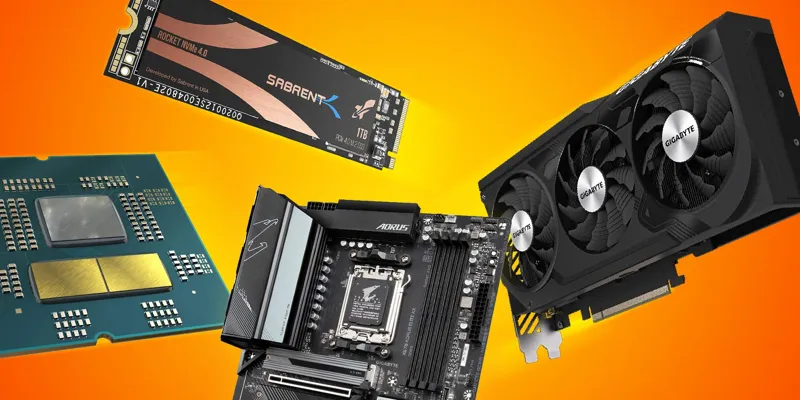When it comes to gaming PCs, the hardware configuration sets them apart from regular PCs, offering superior performance for gaming. Gaming PCs have evolved over the years to meet the increasing demands of modern video games.
While many individuals may have basic knowledge of their PC's components, understanding the best components for a gaming PC requires in-depth research and expertise in PC building. This article aims to simplify this process by providing comprehensive insights into gaming PC hardware.
By the end of this guide, readers will be well-informed about essential gaming PC specs and how to select components to build an optimal gaming rig within their budget. Additionally, recommended hardware guides mentioned throughout the article will aid users in making informed decisions in 2024.
Key Components for a Gaming PC
Each component of a gaming PC plays a crucial role in its overall performance. Key components include the Processor, RAM, Motherboard, Storage, PC Case, GPU, and CPU Cooler. Understanding how to choose these components is essential for building a capable gaming PC:
Processor/CPU

Modern CPUs offer enhanced capabilities compared to previous generations, with a focus on core count and hyperthreading. For optimal performance, a CPU with a minimum of 6 cores is recommended, along with hyperthreading for multitasking.
When selecting a CPU, options like the Intel Core i5 14400F or AMD Ryzen 5600X offer excellent performance for mid-range builds, while high-end setups benefit from CPUs like the Intel Core i5 14600K or Ryzen 7 7800X3D.
Graphics Card

The GPU is a critical component for gaming PCs, handling graphical processing efficiently. Opt for a GPU with at least 6GB of VRAM for 1080p gaming, such as the RX 6500 XT for budget builds or the RX 7800 XT for 1440p gaming.
RAM/Memory
With increasing memory demands, 16GB of RAM is now the standard for gaming PCs to prevent performance issues. Choose RAM kits with higher frequencies like 3200MHz for DDR4 or 6000MHz for DDR5 to enhance gaming performance.
Storage
Fast SSDs have replaced traditional hard drives due to their speed and reliability. Opt for a minimum of 1TB NVMe SSD for primary storage to ensure quick boot times and efficient data access.
Motherboard

Choose a motherboard that supports future upgrades and offers essential features like overclocking capabilities. Consider factors like form factor, chipset, and component support when selecting a motherboard.
Power Supply
A reliable power supply is essential for a gaming PC, providing stable power to all components. Invest in a high-wattage PSU with 80 Plus certification to accommodate future upgrades and ensure system stability.
CPU Cooler

Efficient cooling is crucial for maintaining CPU performance during gaming sessions. Choose an adequate CPU cooler based on your processor's thermal requirements to prevent overheating and ensure stable operation.
Considering Upgradeability
Overlooking upgrade potential can hinder the longevity of a gaming PC. Avoid common pitfalls like outdated components or limited upgrade options by prioritizing future-proof components and balanced hardware selections.
- Choosing a recent CPU and motherboard platform
- Ensuring adequate PSU wattage and efficiency
- Selecting a well-ventilated case for optimal airflow
By addressing these considerations, users can maximize their gaming PC's performance and longevity, avoiding costly upgrades down the line. Planning for future advancements in hardware ensures a seamless gaming experience for years to come.
Conclusion
Building a high-performance gaming PC involves strategic component selection to meet gaming demands effectively. By understanding the essential specs and components required for a gaming PC, users can create a powerful system tailored to their gaming preferences.
FAQ
Q: What specifications are necessary for gaming on a PC?
Game requirements vary, but a potent CPU-GPU combination, 8-16GB RAM, and ample storage are typically essential for modern games.
Q: How should I choose PC specifications for gaming?
Balance is key when selecting PC components to avoid bottlenecks. Consider the interplay between CPU, GPU, RAM, and storage to optimize gaming performance.
Q: How much RAM do I need for gaming?
For 1080p gaming, 8GB RAM is sufficient, but 16GB is recommended for higher resolutions and multitasking.

